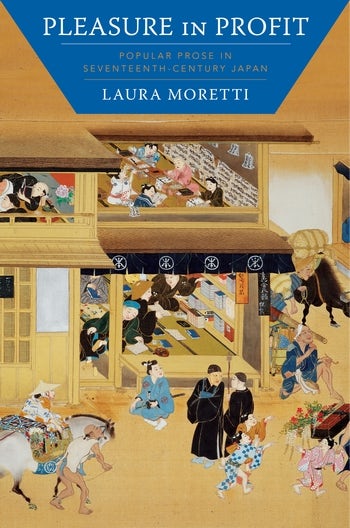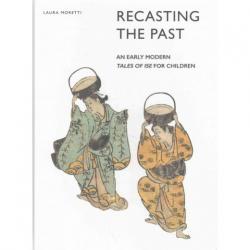
Brought up in Northern Italy and with an ever-growing passion for languages and literature, the choice of Japanese studies came naturally. I developped my love for early modern Japanese literature during my undergraduate course at Università Ca’ Foscari Venezia. The core of my training took place in Japan, where I studied for two years at the The University of Tokyo as a research student. I was awarded my PhD at Università Ca’ Foscari Venezia in 2003. After teaching for nine years at my alma mater, I moved to the UK in 2010 and taught for two years at the School of Modern Languages at Newcastle University (UK). I joined the University of Cambride in 2012. Over the years I spent long periods in Japan and have accumulated teaching experience at different institutions including the University of British Columbia (2008), Keio University (2009), Leiden University (2009), Leuven University (2009), Ritsumeikan University (2010), and Japan Women's University (2016).
Prof Moretti teaches several undergraduate courses, with a focus on Japanese literature up to the 19th century and classical Japanese (bungo). Prof Moretti also teaches Master's students. Her course on early modern Japanese culture explores various aspects of early moder popular literature. She also trains students on how to read and translate early modern primary sources across a wide range of texts.
Prof Moretti welcomes graduate students interested in Japanese premodern and early modern literature. She also strongly encourages projects that investigate early modern Japanese culture more broadly, including visual culture and woodblock prints; book history and/or textual scholarship in Japan; Japanese palaeography and calligraphy, and art.. She is also keen to supervise projects that work on issues of adaptation, canon-making, intervisuality, playfulness, humour, satire, metafiction, didactic prose, medicine in popular culture, and transmedia storytelling.
Prof Laura Moretti's research focusses on early modern Japanese popular literature and culture. Prof Moretti's projects are inherently interdisiplinary, placed at the intersection of literature, art history, book history, textual scholarship, and palaeography. Working with both books and visual media, including woodblock prints and board games, and combining rigorous close reading of a wide range of archival materials with bold intellectual arguments, Prof Moretti's research challenges our understanding of literature and wishes to retrieve textual traditions that have been silenced after the encounter of Japanese literature with "modernity". Prof Moretti's research covers a wide span of time, moving from the seventeenth to the late nineteenth century.
Prof Moretti's first book in English, Recasting the Past: An Early Modern Tales of Ise for Children (Brill, 2016) focusses on how a canonical text of Japanese court literature has been infused with new life in the second half of the eighteenth century when it was remediated as a piece of graphic narrative. Her second book, Pleasure in Profit. Popular Prose in Seventeenth-Century Japan (Columbia University Press, 2020) has been named a 2021 Choice Outstanding Academic Title and was shortlisted for the 2021 DeLong Book History Prize. The first comprehensive study of the birth of Japanese commercial publishing, this monograph recasts books as tools for knowledge making, arguing that popular prose engaged its audience cognitively as well as aesthetically and emotionally to satisfy a burgeoning curiosity about the world. Crucially, it shows that readers experienced entertainment within the didactic, finding pleasure in the profit gained from acquiring knowledge by interacting with transformative literature.
Prof Moretti is now embarking on a new project that revolves around play and playful reading in early modern Japan. In this project Prof Moretti explores books and ephemera that delighted readers with riddles, rebuses, visual and verbal puzzles, jokes, board games, magic tricks, invented script, and much more. The ultimate goal of the project is to explore a mode of reading that differs from aesthetic or efferent; a mode of reading that enables play and gifts readers with rewarding moments of insight. Alongside this project and working with a Japanese colleague from The University of Tokyo, Prof Moretti is also currently editing an edited volume tentatively titled Grass Books. Graphic Narratives from Early Modern Japan. Briging together a remarkable group of authoritative scholars in the field, the volume explores the complex nature of seventeenth, eighteenth, and ninteenth-century graphic narratives, investigating connections with the world of ukiyo-e, theatre, literary modernity, manga, and comix.
Every year Prof Moretti's runs the Summer School in Early-modern Japanese Palaeography. Over the course of eight years she has trained more than 250 young scholars in how to decode, transcribe, and translate early modern Japanese archivale materials. In 2023 the summer school will celebrate the tenth anniversary. The recent collaboration with prof Hashimoto Yuta and his AI-powered transcription platform is fuelling Prof Moretti's interest in digital humanities applied to early modern Japanese literature. Learn more about this in the keynote speech that Prof Moretti gave for the Center for the Development of Educational Materials on Classical Japanese Literature in September 2022: Archive | 古典教材開発研究センター (kotekiri20.wixsite.com)
Scroll below for more research projects.
Current PhD students
| Frederick Feilden: From A to B and Back Again? Picturebook Adaptations in Nineteenth-Century Japan |
| Tian Gao: Exploring a Uniquely Portable Magic: A Cognitive approach to Japanese Reading Materials for Children |
| Helen Magowan: Nyohitsu - the construction of femininities through writing |


